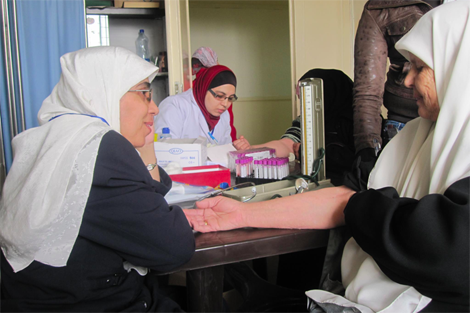July 14, 2014 — Making use of the ties between friends and family to promote healthy behaviors appears to motivate people to better manage their weight over the long term—and reduce their risk for obesity and diabetes—even in places with limited resources and high rates of chronic disease, according to a project led by researchers at Harvard School of Public Health (HSPH) and Microclinic International (MCI), a California-based nonprofit.
The project, conducted in Amman, Jordan, and led by HSPH’s Eric Ding and Daniel Zoughbie, founder and CEO of MCI, earned Ding the Consortium of Universities for Global Health’s award for Global Health Project of the Year at the annual CUGH conference held in Washington D.C. May 10-12, 2014.
A friends and family plan
For the Amman project, local health workers helped establish small groups of family, friends, coworkers, and neighbors to work together to lose weight and keep it off, or make other lifestyle changes. These groups of 2-8 people—called “microclinics”— then followed a curriculum from MCI that urged participants to encourage each other to maintain a healthy lifestyle.
The researchers sought to determine the effectiveness of the microclinic concept by comparing three different types of friends-and-family groups. One group participated in all aspects of the curriculum—they attended health education sessions on topics such as healthy foods, physical activity, and diabetes and heart disease; had their weight, blood pressure, and other health factors periodically monitored; participated in hands-on activities, such as learning about cooking healthy meals and exercising together; and were urged to support each other in their weight-loss efforts. A second group had health education and health monitoring only; and a third group had only monitoring.
Final results for the Amman project are due later this year. But similar projects implemented by Microclinic International—in locations including Appalachia, the Palestinian territories in the West Bank, remote communities in Kenya, and rural villages in India—have suggested that groups that participate in the full curriculum, with the strongest emphasis on shared activities and mutual support, tend to be most successful at helping participants lose weight, keep it off, and gain metabolic benefits.
For example, in a previous project in Jordan—where nearly two-thirds of the population is overweight or obese and has a high prevalence of diabetes—the researchers found that, even two years after completing a four-month program emphasizing shared weight-loss activities and peer support, participants still maintained weight loss and significantly reduced their blood glucose levels.
Moreover, in another Harvard-MCI collaboration led by Ding and Zoughbie in Appalachia, participants in a nine-month social network program were able to improve their weight, waist circumference, glucose control, and blood pressure control, and to sustain the improvements 16 months past the beginning of the program.
Motivate, energize

“There are dozens and dozens of lifestyle modification programs out there, but most of them do not yield long-term sustained effects and are not designed to propagate health to communities as a whole,” said Ding, research scientist in the Department of Nutrition at HSPH. “Most of the time, people regain any weight they’ve lost after six months or a year. In those programs, participants don’t know each other, but the microclinic social network health model is different because it leverages the power of pre-existing groups of friends and family to help establish and propagate healthy behaviors.” He added that the microclinic social network programs are inexpensive and can be easily implemented in resource-limited communities.
Ding and Zoughbie are starting a new randomized trial to further study social networks and health later this year in Qatar.
Others involved with the Amman project include Andrea Feigl, a doctoral candidate in the HSPH Department of Global Health and Population; Leila Makarechi, MCI’s chief operating officer; Nancy Bui, senior vice president at MCI; and Kathleen Watson, a Columbia University graduate student (also a recipient of the CUGH award).
photos courtesy Eric Ding
